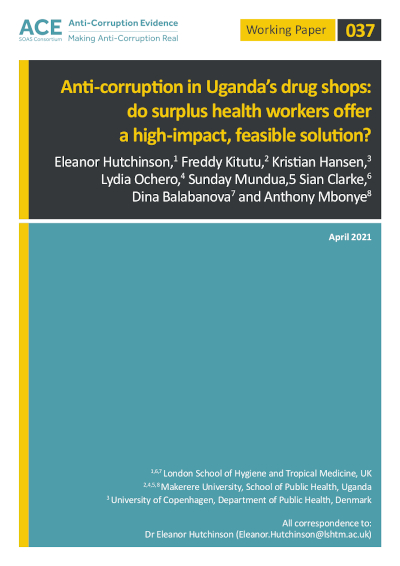
Publication Type: Working Paper
Countries: Uganda
Authors: Eleanor Hutchinson, Freddy Kitutu, Kristian Hansen, Lydia Ochero, Sunday Mundua, Sian Clarke, Dina Balabanova, Anthony Mbonye
Publication date: April 2021
Keywords: Health
In many African countries, the majority of sick adults and children seek healthcare from medicine retail outlets which are licensed to sell over-the-counter drugs. This includes malaria treatment and occasionally antibiotics. As such, these outlets provide a critical service, enabling access to life-saving medicines for all income groups in both urban and rural areas.
Yet rule violations are commonplace. Examples include retailers operating without a licence;
offering services beyond their legal permits and professional capacity (such as in-patient care); selling poor quality products in inappropriate quantities; and failing to refer clients for other medical services when appropriate or necessary.
In a context of high rates of morbidity and mortality from communicable disease, these rule
violations have devastating consequences for individuals and severe costs for society. They
increase the likelihood of catastrophic expenditure on health and often for services that may not improve health outcomes. They also drive antimicrobial resistance, which increases the costs of medicines and threatens to render many classes of antibiotics ineffective.
Current policy options provided by global health actors to improve medicine markets in low-income countries include either investing heavily in primary healthcare to curtail the market for medicine sellers; or introducing educational and subsidised commodities to improve practices. In Uganda, the focus of this paper, recent cuts in the health budget make substantive investment in primary healthcare highly unlikely. Research suggests that education, subsidised commodities and service improvement programmes are insufficient to affect the sorts and the scale of changes necessary to reform the medicines market and make it work for those providing and seeking healthcare.
Using a mixed-methods approach, this study combines observation, qualitative interviews, focus group discussions and key informant interviews with a mapping exercise and survey to understand the drugs retail market in Uganda. Drawing on the SOAS Anti-Corruption Evidence (ACE) framework, it considers a new governance pathway for drugs retail outlets, arguing that corruption can only be tackled effectively if interventions work as part of the existing institutional framework. This means working within the current regulatory system and identifying drug shop vendors (DSVs) who are likely to support effective forms of regulation. The paper considers the extent to which one particular group of DSVs might support regulatory change and rule-abiding behaviour in the market: this group consists of trained nurses and midwives, most of whom are women and all of whom are surplus to the absorption capacity of the formal health system.
With no access to positions within the public system or large private hospitals, these surplus health workers will likely spend their careers working in the medicine retail sector. While our research indicates that not all surplus health workers would support the idea of regulatory change, it was those who work in drug shops with mid-level profitability and those in the least profitable group of shops understand that poor regulation creates saturated markets that, in turn, make it difficult to run a profitable business. We find that this group of DSVs support the idea of changes to regulation that would include the involvement of drug shops, their lobby group and local community leaders. Any feasible, high-impact strategy must ensure that there is no negative impact on access to antibiotics through this policy change, however, as these are the most profitable medicines for drug shops. Therefore, a new, more effective form of regulation would have to change the rules for drug shops to acknowledge the role that these outlets play in the distribution of some antibiotics from the ‘access’ list of the World Health Organization’s (WHO) ‘Access, Watch, Reserve’ (AWaRe) strategy.

